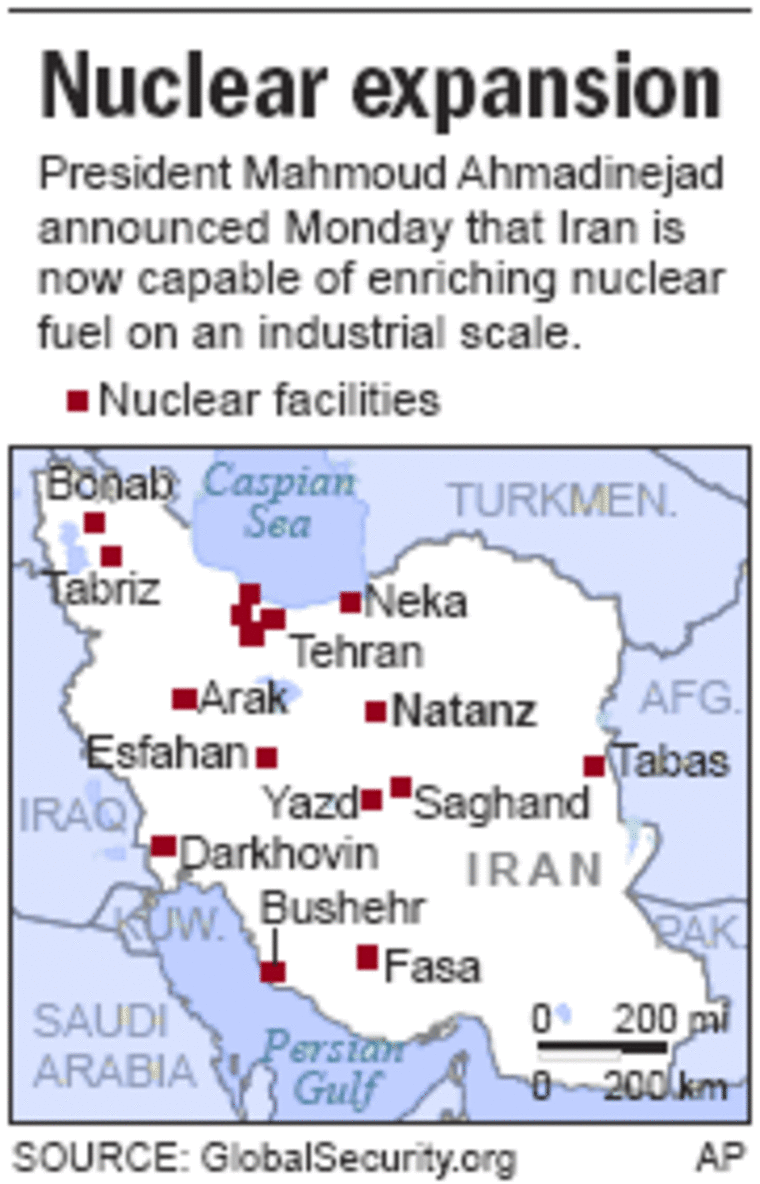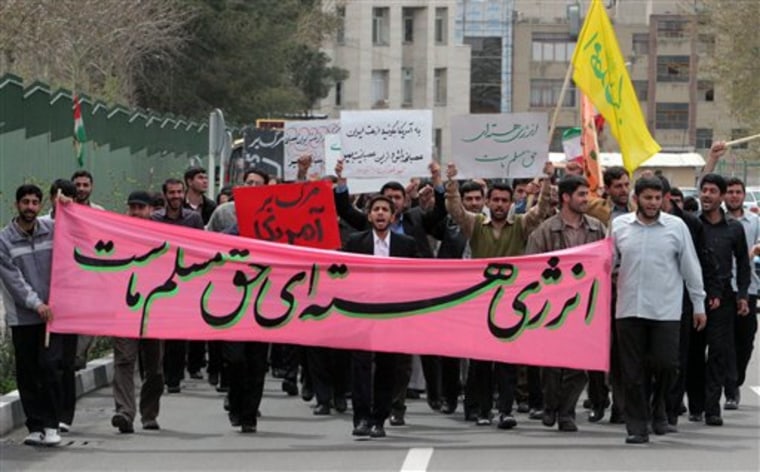Iranian President Mahmoud Ahmadinejad announced Monday that Iran was now capable of producing nuclear fuel on an "industrial scale" in an expansion of the uranium enrichment program that the United Nations has demanded it halt.
The announcement suggests Iran has succeeded in operating a larger number of centrifuges at its Natanz enrichment facility in central Iran.
Asked if Iran has begun injecting uranium gas into 3,000 centrifuges for enrichment, top nuclear negotiator Ali Larijani replied, “Yes.” He did not elaborate, but it was the first confirmation that Iran had installed the larger set of centrifuges after months of saying it intends to do so. Until now, Iran was only known to have 328 centrifuges operating.
"With great honor, I declare that as of today our dear country has joined the nuclear club of nations and can produce nuclear fuel on an industrial scale," Ahmadinejad said.
U.S. decries ‘missed opportunity’
The United States criticized Iran's latest statements.
"It's a missed opportunity," State Department spokesman Sean McCormack said when asked about Iran's announcement. "This is another signal that Iran is defying the international community."
McCormack said the U.N. Security Council and the U.N. nuclear watchdog group “don’t believe Iran’s assurances that their (nuclear) program is peaceful in nature.”
The White House also criticized the announcement.

“Iran continues to defy the international community and further isolate itself by expanding its nuclear program, rather than suspending uranium enrichment,” said Gordon Johndroe, a spokesman for the National Security Council.
The United Nations has vowed to ratchet up sanctions as long as Iran refuses to suspend enrichment. The Security Council first imposed limited sanctions in December, then increased them slightly last month and has set a new deadline of late May.
“What we are looking for are reasonable Iranian leaders who view the cost-benefit calculation and see that it is not to the benefit of the Iranian people to continue to pursue the course on which they find themselves,” McCormack said.
Analyst doubts scale of production
Michael Levi, a fellow for science and technology at the Council on Foreign Relations, was skeptical of the Iranian claims. He said by his calculations, the capabilities Iran has just announced would provide 10 percent of the material needed to run its plant.
“To me, that’s not industrial scale,” Levi said. “An industrial-scale facility is a facility that can support your industry.”
On the other hand, “from a political perspective, it’s more important to have them in place than to have them run properly,” he explained since the announcement stirs up support and patriotism at home, and the international community has almost no way to verify how well the program is working.
“Iran looks to be moving its nuclear program along on a political schedule rather than a technical schedule,” Levi said.
Levi marveled that Iran has the power to cause such a stir with an announcement. He noted that most of the time, world leaders complain they can’t trust Iran, “except when they say something really scary, we take them at their word.”
The U.N. has imposed limited sanctions on Iran until it suspends enrichment a key process that can produce either fuel for a nuclear reactor or the basis of a warhead. The United States and its allies accuse Iran of seeking to build nuclear weapons, a claim the country denies.
Defying the sanctions
Meantime, Iranian state television reported Monday that an Iranian Revolutionary Guard general who is banned from traveling abroad under the sanctions has visited Russia without any difficulty.
Gen. Mohammad Baqer Zolqadr, who is also deputy interior minister for security affairs, was quoted on the state TV Web site as saying that his six-day journey to Moscow, which ended Monday, showed "the ineffectiveness of the resolution."
The resolution calls on all governments to ban visits by the 15 individuals and says that should such visits occur — presumably for exceptional circumstances — the countries should notify a U.N. committee.
Russian Foreign Ministry spokesman Andrei Krivtsov confirmed that Zolqadr visited Russia. He told The Associated Press that the resolution does not prohibit visits by the listed individuals, instead calling for heightened vigilance and attention, and that "this vigilance is directed first of all at people who are directly related to nuclear programs," suggesting that Zolqadr was not.
EU boycott
The unveiling of new centrifuges at Natanz would be a strong show of defiance toward the United Nations, which has vowed to ratchet up sanctions as long as Iran refuses to suspend enrichment. The Security Council has set a new deadline of late May.
Tensions are also high between Iran and the West following the 13-day detention of 15 British sailors by Iran. The sailors, who were seized by Revolutionary Guards off the Iraqi coast, were released on Wednesday, but since then have said they were put under psychological pressure by their captors to force them to "confess" to being in Iranian waters when captured, angering many in Britain.
Diplomats from developing nations were attending Monday's celebrations at Natanz, but diplomats from European Union boycotted to protest Iran's refusal of the U.N. demands, said the Foreign Ministry in Germany, which currently holds the EU presidency.
Larijani said his country was willing to negotiate with the West and offer assurances that its program is peaceful. But he said the West must accept its nuclear program as a fact.
"We are ready to reach understanding with the Westerners through a corridor of real negotiations — in the current situation, in which Iran's nuclear activities have been concluded," state television quoted Larijani as saying.
"The understanding regards assuring the other party about the peacefulness of Iran's nuclear activities," he said. "But we do not give in our rights."
‘National day of nuclear energy’
Across Iran, school bells rang to mark the "national day of nuclear energy." The government sent out SMS messages of congratulations for the occasion to millions of mobile phone users.
In Tehran, some 200 students formed a human chain at Iran's Atomic Energy Organization while chanting "death to America" and "death to Britain." The students burnt flags of the U.S. and Britain.
On April 9, 2006, Iran announced it had first enriched uranium using an array of 164 centrifuges.
Iran has said its next step is to set up 3,000 centrifuges, but it is not clear where the project stands. Experts say the Natanz plant needs between 50,000 to 60,000 centrifuges to consistently produce fuel for a reactor or build a warhead.
In the enrichment process, uranium gas is pumped into a "cascade" of thousands of centrifuges, which spin the gas at supersonic speeds to purify it. Uranium enriched to a low level, at least 3 percent, can be used as fuel, while at a far higher level, more than 90 percent, it can be used to build a weapon.
Iran currently has two cascades of 164 centrifuges each operating at an aboveground portion of the Natanz facility in central Iran. The two cascades have produced small quantities of non-weapons grade enriched uranium, U.N. nuclear inspectors have said.
